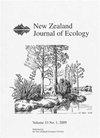气候变化对新西兰生物遗产的现有知识和潜在影响
IF 1.4
3区 环境科学与生态学
Q3 ECOLOGY
引用次数: 5
摘要
:虽然全球气候变化正在影响世界各地的生物群,但新西兰的海洋气候变化很大,相对温和,因此气候变化有时被视为对物种和生态系统的最小威胁,尤其是与入侵物种的更直接威胁相比。然而,气候变化将改变降雨模式,增加极端事件的发生率和严重程度,并逐渐升高温度,这一切都将改变陆地、淡水和海洋系统。我们对新西兰报告的气候变化影响的全面审查表明,迄今为止,大多数测量到的影响是由于间接影响(如入侵物种影响的加剧),大多数是在海洋领域。海洋酸化和海洋热浪分别对钙质生物和藻类来说尤其成问题。其他显著影响包括高山地区的热挤压和干旱对淡水鱼的影响。极少数稀有和受威胁物种极易受到极端事件(如火灾、洪水)的影响。虽然在一些地区和一些生态系统中,气候变化影响的证据很少,但我们鼓励持续监测,以确定可能需要缓解的下降过程。我们确定了五个关键的研究需求,以提高我们对气候变化对新西兰奥特亚生物多样性威胁的理解。本文章由计算机程序翻译,如有差异,请以英文原文为准。
Current knowledge and potential impacts of climate change on New Zealand’s biological heritage
: While global climate change is impacting biota across the world, New Zealand’s maritime climate is highly variable and relatively mild, so climate change is sometimes seen as a minimal threat to species and ecosystems especially in comparison to the more immediate threat of invasive species. However, climate change will alter rainfall patterns, increase the incidence and severity of extreme events, and gradually increase temperatures which will all modify terrestrial, freshwater, and marine systems. Our comprehensive review of reported climate change impacts in New Zealand indicates that most measured impacts to date are due to indirect impacts (such as exacerbation of invasive species impacts) and most are in the marine realm. Ocean acidification and marine heatwaves are particularly problematic for calcareous organisms and algae respectively. Other notable impacts include thermal squeeze in the alpine zone and impacts of drought on freshwater fish. Very small populations of rare and threatened species can be very vulnerable to extreme events (e.g. fire, floods). While the evidence for climate change impacts is sparse in some regions and for some ecosystems, we encourage ongoing monitoring to identify processes of decline that may need to be mitigated. We identify five key research needs to improve our understanding of the threat of climate change to the biodiversity of Aotearoa New Zealand.
求助全文
通过发布文献求助,成功后即可免费获取论文全文。
去求助
来源期刊

New Zealand Journal of Ecology
环境科学-生态学
CiteScore
3.00
自引率
12.50%
发文量
35
审稿时长
>36 weeks
期刊介绍:
The New Zealand Journal of Ecology is a biannual peer-reviewed journal publishing ecological research relevant to New Zealand/Aotearoa and the South Pacific. It has been published since 1952 (as a 1952 issue of New Zealand Science Review and as the Proceedings of the New Zealand Ecological Society until 1977). The Journal is published by the New Zealand Ecological Society (Inc.), and is covered by Current Contents/Agriculture, Biology and Environmental Science, GEOBASE, and Geo Abstracts.
 求助内容:
求助内容: 应助结果提醒方式:
应助结果提醒方式:


